In this report, our 18th standalone annual sustainability report, we aim to demonstrate that YTL Group remains aligned with the promise of being good stewards of the Earth in all of our business units, serving the environment, communities and our other key stakeholders. This has been a recurring theme since our first sustainability report in 2007, and since our humble beginnings in 1955. As we broaden and deepen sustainability reporting across the group, both YTL Power International Berhad (YTLPI) and Malayan Cement Berhad (MCB) will for the third consecutive year, publish their own standalone sustainability reports. I am pleased once again to report that YTL Corporation Berhad (YTL Corp) has been included for the eighth consecutive year as a constituent of the FTSE4Good Bursa Malaysia (F4GBM) Index, and that YTLPI is now also a constituent of the same index. This year I look at how we prioritise transition through a range of solutions, and I trust that you will find our broader scope and boundaries in this report an inspiration for sustainable action in your own realms.
OCCAM'S RAZOR AND ENVIRONMENTAL SUSTAINABILITY AT YTL
Occam's razor is the problem-solving principle that recommends searching for explanations constructed with the smallest possible set of elements. This may also be applied to environmental solutions, especially when time is a critical factor. On one hand, there are simple, clear and effective solutions that can help address environmental challenges which may require lifestyle or habit adjustments. On the other hand, there are more complicated, technologically-ambitious solutions that may be years or decades away from practical use but which do not require us to change our habits such as nuclear fusion or geoengineering. We should not be distracted by these high-tech solutions, but continue to pursue emission reductions, prudent resource use, waste management and circularity as priorities, at the same time respecting the potential of the more complex ones.
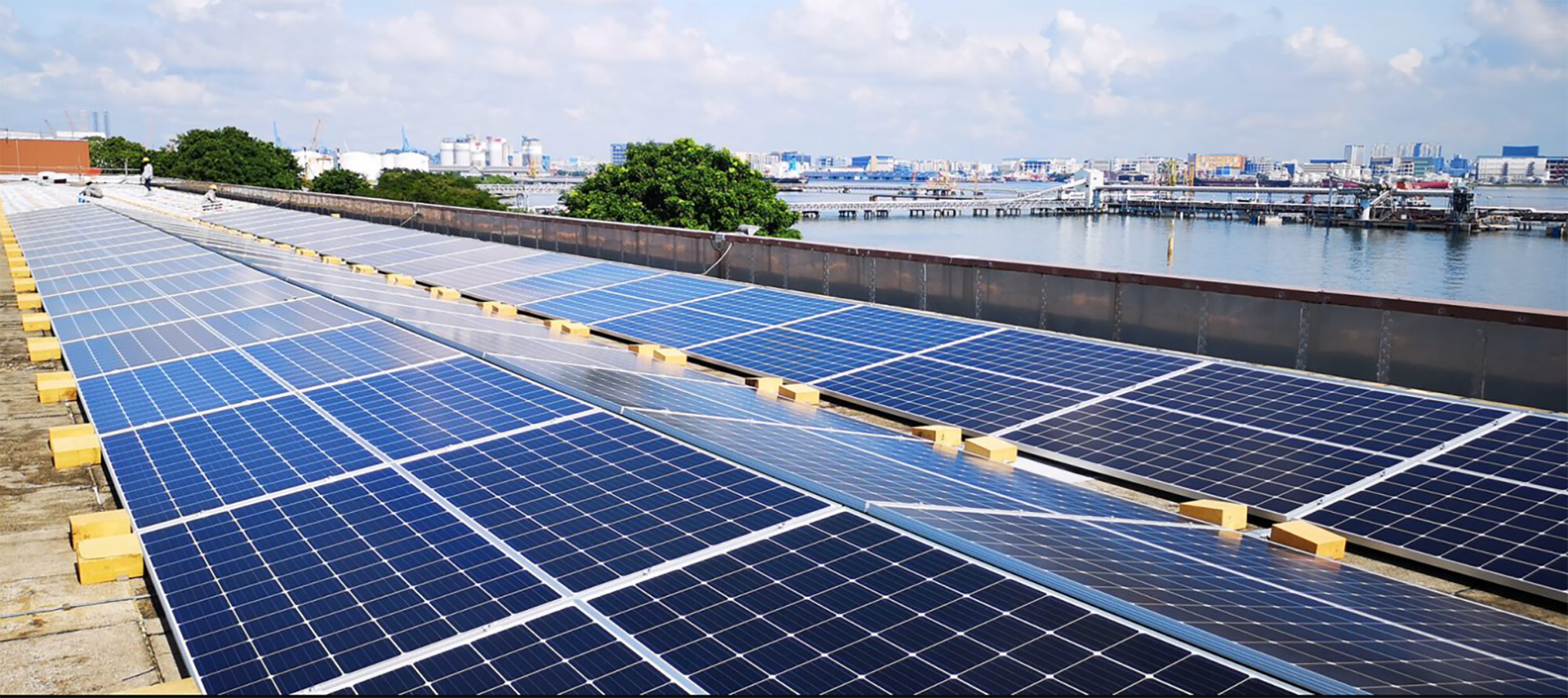 Solar installation at YTL PowerSeraya
Solar installation at YTL PowerSerayaIn YTL Group, there are a number of examples of pursuing the simple solutions as a priority, but still ensuring that we also continue to explore the more technologically ambitious ones. The first is the construction of a 600 Megawatt (MW) hydrogen-ready power plant in Singapore. In January 2024, YTL PowerSeraya was awarded the right to build, own and operate a hydrogen-ready combined cycle gas turbine unit with a capacity of 600 MW. The new turbine unit will be built at the company's existing Pulau Seraya Power Station site on Jurong Island. It will be at least 30% volume hydrogen ready and can be retrofitted to become 100% hydrogen ready operationally. In a further bid to reduce emissions from power generation activities, YTL PowerSeraya will invest more than SGD5 million to increase the solar power generated at its Pulau Seraya Power Station in Singapore to 5 Megawatt-peak (MWp), up from the existing 1 MWp. The increased capacity, which can produce a monthly average of 417 MWh under optimal conditions, will be able to power more than 1,000 four-room Housing and Development Board flats.
Another example is the development of the YTL Green Data Center Park in Kulai, Johor, with a capacity of up to 500 MW. This will be the first data center campus in Malaysia to be co-powered by on-site renewable solar energy. The campus incorporates innovative and sustainable solutions in design and operations to achieve high-energy efficiency and is expected to serve a growing demand in the region for eco-friendly, cost-efficient data center solutions from hyperscalers and co-location customers alike.
YTL Cement Group is "Helping Build Greener" by offering the market low-carbon alternatives through their ECO product range. These products empower customers to embrace more sustainable building practices without compromising on quality or safety.
With lower embodied carbon, the inclusion of recycled materials and enhanced durability requiring minimal maintenance, the ECO range is a testament to innovation and responsibility. In addition, YTL Cement Group continues to explore and expand the use of alternative fuels, raw materials, waste heat recovery systems and renewable energy. In the last three years, they have processed over three million tonnes of industrial, commercial, and agricultural waste for use as alternative materials.
Internally at YTL Cement Group, this is backed by in-house research via the Construction Development Lab (CDL), exploring decarbonisation research and development (R&D) and product innovation, ensuring that they remain at the forefront of sustainable construction. Externally, their CDL Academy has facilitated over 80 knowledge-sharing sessions since 2019, working closely with industry associations and top local universities. These sessions have been pivotal in fostering important conversations around Environmental, Social and Governance practices, particularly in supporting small and medium-sized enterprises in their sustainability journey. This year, they expanded their masterclass series to East Malaysia, collaborating with Universiti Malaysia Sarawak (UNIMAS) and Universiti Malaysia Sabah (UMS). MCB has partnered with the Construction Industry Development Board (CIDB) through its research arm, the Construction Research Institute of Malaysia (CREAM), where MCB provided a MYR1 million grant to support research in sustainable construction. Additionally, MCB has continued its collaboration with The Edge Malaysia to co-host the second Sustainable Construction Symposium, further promoting discussions around sustainable practices within the industry.
YTL Cement Group continues to explore and assess emerging decarbonisation technologies and new developments in existing production technology, and they have formed a multi-disciplinary working group to lead feasibility studies in areas where they have identified technologies that have the potential to be applied in their operations. This includes areas such as R&D in microalgae cultivation, which has been extensively studied as a promising technology for CO2 capture, long-term storage and biofuel production, known as Project ReGen, with the goal of reducing the energy consumption involved in microalgae cultivation. These are supplemented by other initiatives such as concrete early-age carbonation where the exposure of fresh concrete to CO2 is found to improve concrete compressive strength resulting in the potential to reduce Portland cement content whilst also sequestering CO2 in the concrete.
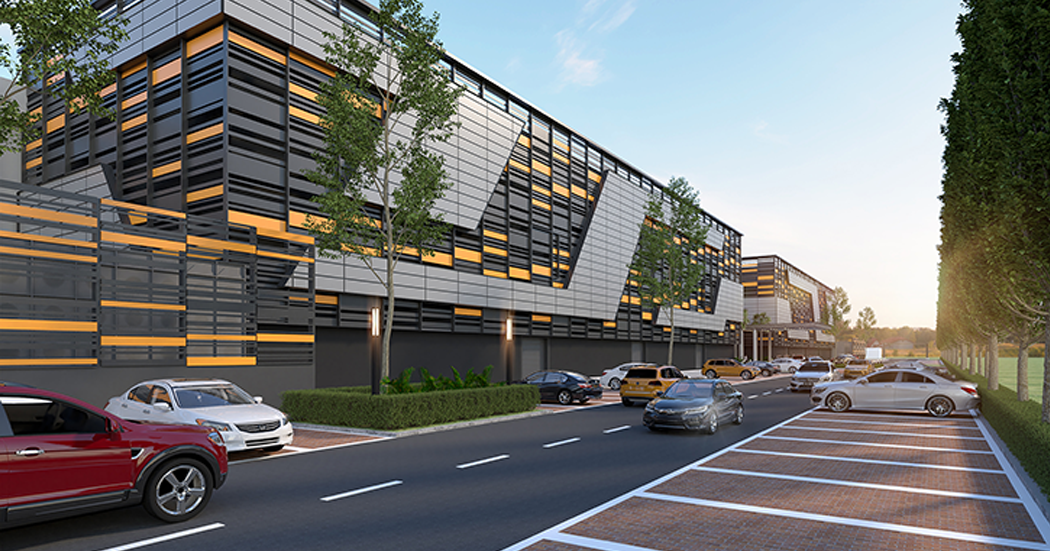 Artist's impression of the green data center campus in Johor
Artist's impression of the green data center campus in Johor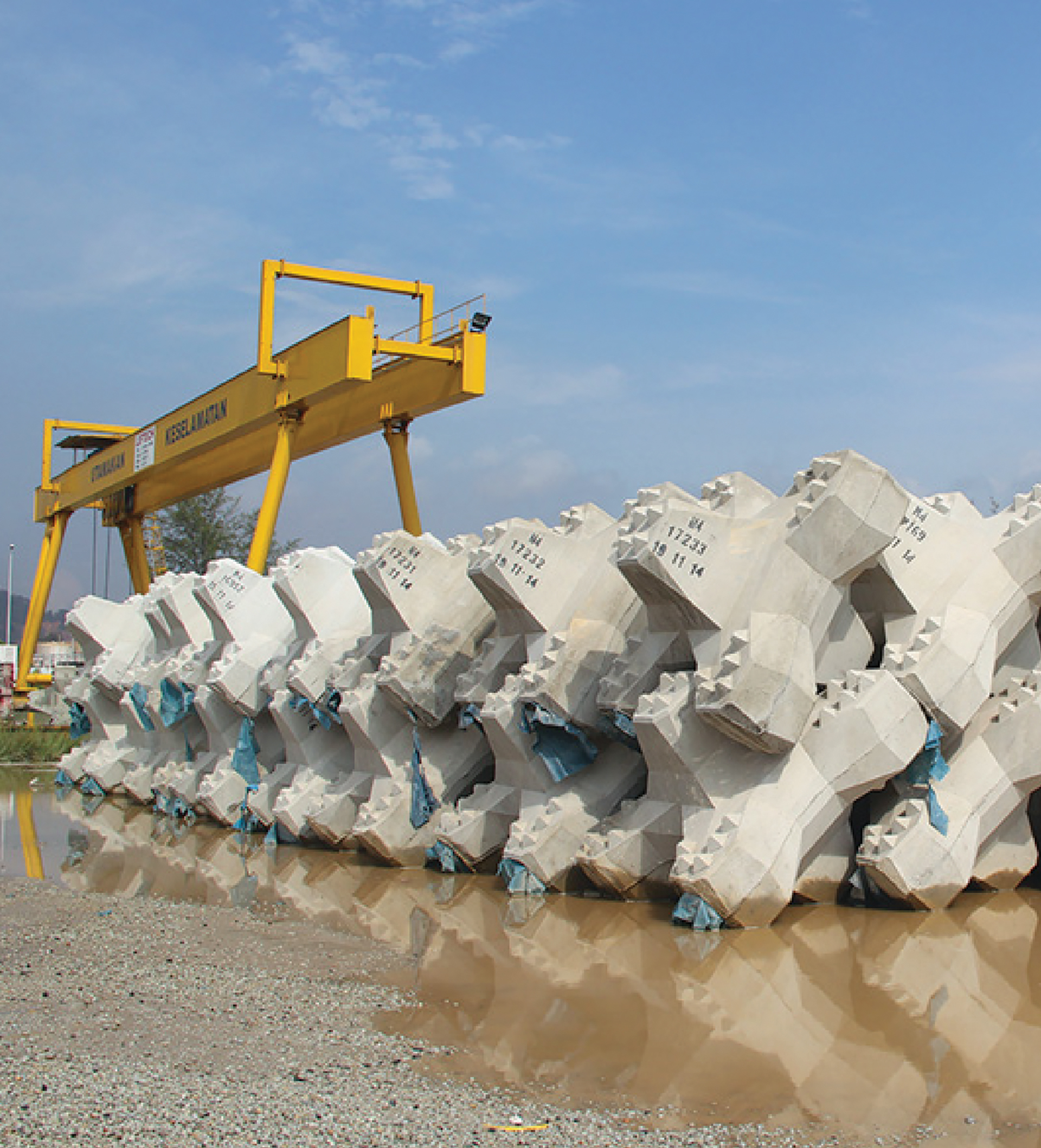
Example of Slagcem combining Ground Granulated Blast Furnace Slag and Ordinary Portland Cement
THE JOURNEY CONTINUES – UNDERSTANDING CONSEQUENCES AND MANAGING RISK
A number of broad themes that continue to shape our long-term sustainability strategy include climate change, evolving socio-economic issues and intensifying geopolitical tensions which is detailed in our section on the assessment of various risks, opportunities and our approaches in regards to the formulation of strategy for both short and long-term mitigation or adaptation measures. Whilst we have limited or no control over these trends, we need to understand the consequences when formulating our sustainability strategy, frameworks and governance structures. This continues to remain a central premise in our approach to sustainable business development.
Resource scarcity and the potential for conflict is exacerbated by extreme weather events and geopolitical tensions. This year, once again we have witnessed the hottest days since records began in 1940, added to by heightened geopolitical conditions, resulting in intensified uncertainty and unpredictability. Climate change is also exacerbating a number of the conditions that fuel conflict, demonstrating again that the two issues are not mutually exclusive.
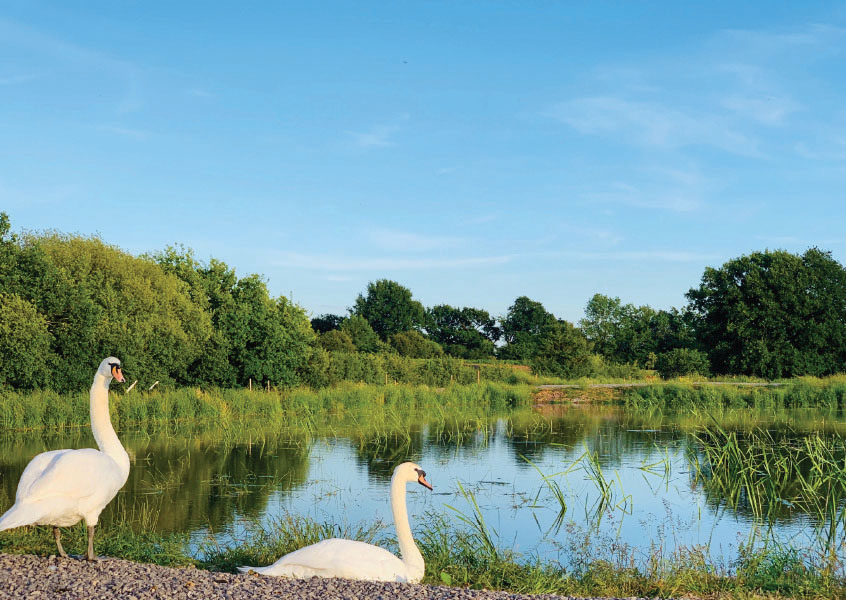
Wiltshire Wildlife Trust in partnership with Wessex Water
Water is one of the most precious and yet most delicate resources on the planet, and global warming is associated with more extreme weather, and in the UK, will lead to drier summers and wetter winters. It is essential that we provide resilient water and wastewater services throughout these inevitable changes. Wessex Water (a subsidiary of YTLPI) has implemented even more stringent controls to ensure that robust operational measures are employed in its operations. The company is championing a new approach to environmental regulation with the Sustainable Solutions for Water and Nature (SSWAN) partnership. Together with Green Alliance, The Rivers Trust, Royal Society for the Protection of Birds (RSPB), The Wildlife Trusts, Sustainability First, Chartered Institution of Water and Environmental Management (CIWEM) and Water UK, the partnership proposes replacing today's fragmented regulatory model with a catchment-wide approach which works across sectors and prioritises efficient, nature-based and low-carbon solutions. We understand that the demands in the UK from the public, media and politicians for healthier water courses has rightly grown stronger. In common with other English water companies, every Wessex Water storm overflow is now monitored and using artificial intelligence (AI) to enable faster responses and preventive action. We are pleased to report that serious pollution incidents were reduced to just one reported in the year and the company received the highest rating possible of four stars from the Environment Agency. Wessex Water is working with the government and regulators on using nature-based solutions to help reduce spill frequency and duration, as part of the overall solution.
CLIMATE ATTRIBUTES, DECARBONISATION & BIODIVERSITY IN YTL GROUP
The carbon markets have undergone a severe period of reckoning and adjustment over the last two years due to integrity and quality concerns. Liquidity and dated vintages have also affected their credibility, with half of the voluntary carbon credits retired this year being at least five years old for vintages from 2019 or earlier. However, scrutiny of the carbon markets may have a silver lining.
Despite the correction and stocktaking in the carbon markets, there were more sales in the carbon removal sector during the first half of 2024 than during the whole of 2023 fuelled largely by big ticket tenders. The key to the continued proliferation or success of carbon credits, will be their role as a catalyst for investment in climate action and mitigation rather than just another mechanism to offset emissions.
As a large infrastructure conglomerate, YTL Group provides essential services and products in many parts of the globe with various environmental and social impacts. One of the reasons that YTL Group is well positioned to develop green data centers is that we have decades of experience operating low-carbon energy and water utilities in Malaysia, Singapore and the UK, in addition to the implementation of waste heat recovery units in our cement and hospitality divisions. In addition, our experience in carbon consulting under YTL-SV Carbon which YTL Corp incorporated in 2008, helps us to provide detailed and robust data for our existing operations.
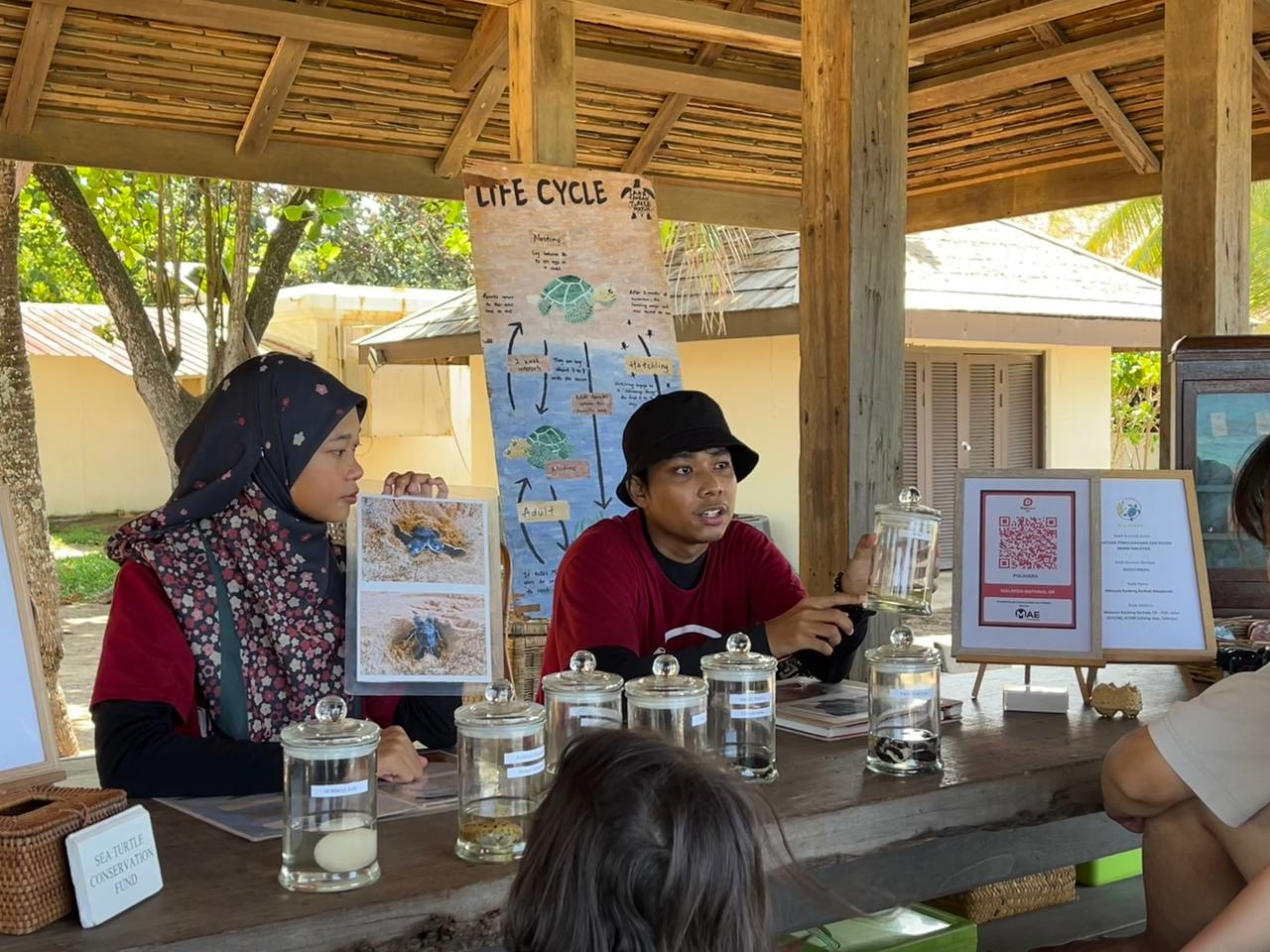
Volunteers giving a talk about turtle conservation at the Turtle Hatchery, Tanjong Jara Resort
Whilst we have retained our overarching target for YTL Group to reach carbon neutrality by 2050, we have tightened up aspirations in some of our business units as we recognise the importance of setting targets that we can not only reach, but also those which stretch us. Internally, we have intensified our efforts to minimise negative impacts and enhance positive impacts in all of our operations. However, in areas where the levers or technological solutions to tackle hard-to-abate emissions are not yet commercially available, such as in our Singapore power operations, we have plans to procure high-quality eligible international carbon credits to complement our investments in energy efficiency and low-carbon power technologies.
In YTL Cement Group, their aspiration is to achieve carbon neutrality in operations by 2050. They have developed a decarbonisation strategy to meet their long, medium and short-term greenhouse gas reduction targets to prioritise their efforts and effectively allocate resources. Their strategy comprises four priority areas – production, sustainable construction, CO2 technology and the fundamentals. We have a section in this report dedicated solely to the respective decarbonisation targets and roadmaps.
YTL Group continues to support conservation causes and the protection of biodiversity in all areas where we operate, and also those which are close to our hearts. In addition to the rehabilitation of coral reefs, the extensive work we do in Gaya Island Resort, saving turtle eggs in Tanjong Jara Resort and the protection of endemic species of flora and fauna in karst outcrops which are made up of limestone, we also continue to support the protection of wild tigers. Following the exhibition at the Royal Albert Hall, London, the "Eye on the Tiger", we hosted the Asian leg of the exhibition at The Starhill and Lot 10, Kuala Lumpur in September 2023. It remains the world’s largest wild tiger photography exhibition, featuring 30 of the world's leading photographers and 60 stunning images, providing an ideal platform to raise awareness about the plight of the wild tiger.
COMMUNITIES, OUR PEOPLE & RESPONSIBLE PRODUCTS AND SERVICES
Social initiatives which fall into general community initiatives and those which impact people employed by YTL Group are of utmost importance, and we continue to ensure that both workplace and community issues are understood, addressed and acted on, and also closely integrated with delivering responsible services and products.
One of our oldest companies in the Group, YTL Construction, achieved 28 million safe man-hours for the Gemas-Johor Bahru Electrified Double Track Project, setting a national record for rail construction safety in Malaysia, and marking the highest number of safe man-hours to date. They also embarked on their Transformation 3.0 journey, themed "Building Better 3.0" that emphasises the development of talent, including the Critical Talent Programme and the Graduate Trainee Programme. The company also set up Santun Komuniti YTL, to establish strong, mutually respectful relationships with the local community, with a focus on public engagement, corporate social responsibility (CSR), and education initiatives. Since 2018, YTL Construction has launched over 50 CSR programmes, positively impacting over 30,000 individuals in Johor, Kuala Lumpur and Selangor. In another project, the Johor Data Center, the construction division has utilised drones, 360-degree cameras and Augmented Reality to enhance safety, reduce costs and save time in the construction.
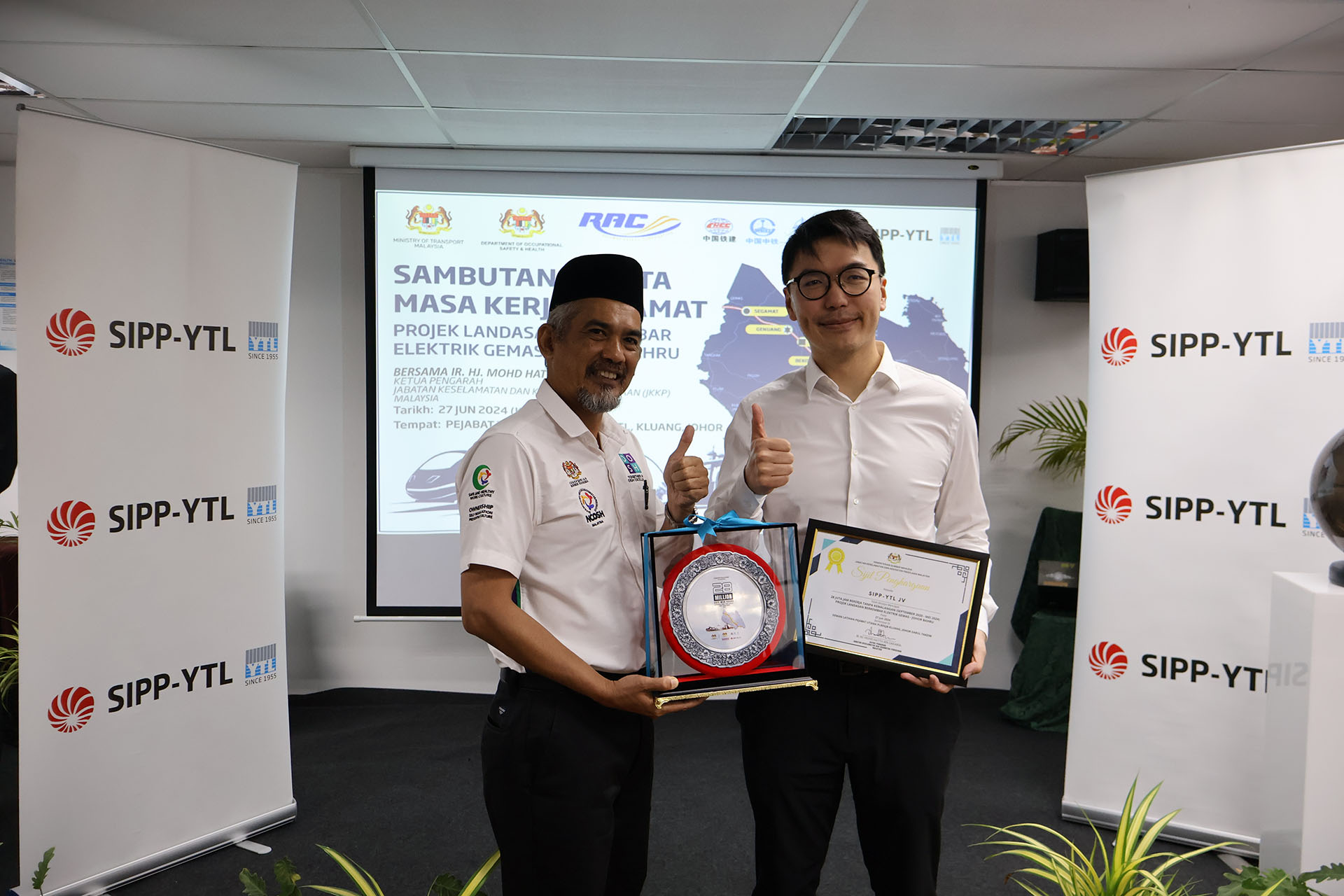
SIPP-YTL JV, a subsidiary of YTL Construction, achieved 28 million safe man-hours, setting a record for rail construction safety in Malaysia
In a multi-stakeholder collaboration between YTL Construction, YTL Foundation and Yellow House KL, the Yellow House Rejuvenation project was conceived. The project which is expected to be completed by this year, involves the extensive use of sustainable building materials such as bamboo and the involvement of YTL Construction's employees in fundraising efforts. YTL PowerSeraya's retail brand, Geneco SG has further strengthened its market presence and remains Singapore's No.1 residential electricity retailer with more than 170,000 customers, which represents a 6% increase from the previous year. Geneco SG achieved a record milestone at the 12th edition of the Loyalty Engagement Awards 2024, recognising companies in Asia Pacific for their customer loyalty and engagement campaigns, and won 12 awards in total - two golds, six silvers and four bronzes. YTL PowerSeraya has also improved its responsible governance by introducing a Supplier Code of Conduct at the end of June 2024 to integrate ESG criteria into supplier management, and enhance transparency in their supply chains.
In another project to reach out to the public, YTL PowerSeraya organised a public movie screening of a multi-award-winning environmental documentary, "The Human Element", at the Singapore Botanic Gardens in June 2024, a collaboration with the National Parks Board and in support of the Ministry of Sustainability and Environment (MSE)'s nationwide Go Green SG 2024 campaign, was attended by more than 1,000 participants and graced by Dr Amy Khor, Senior Minister of State from the MSE.
Within the Group's Singapore operations, YTL PowerSeraya received recognitions by the way of four Tripartite Standards for their practices in Recruitment, Flexible Work Arrangements, Employment of Term Contract Employees and Age-Friendly Workplace Practices. This initiative, led by the Tripartite Alliance for Fair and Progressive Employment Practices, identifies and honours employers with progressive employment practices and standards. These recognitions reflect the company’s unwavering commitment to fostering a fair, inclusive and dynamic work environment for all their employees.


YTL PowerSeraya hosted a free screening of "The Human Element" at Singapore Botanic Gardens in 2024, graced by Amy Khor, Senior Minister of State from MSE. Image courtesy of MSE
CONCLUDING REMARKS
During the Renaissance, around the 15th century, a number of inventions marked the progress of mankind, including the telescope, microscope, steam engine, printing press, pendulum clock, eyeglasses, the humble matchbox and pencil, the submarine and numerous other advances. Although AI will not be the silver bullet for climate change solutions, it will accelerate the progress of innovation and perhaps usher in a new era of renaissance assisted by AI. If we circle back to the scientific precept of Occam's razor, it is only logical that we utilise AI to direct us to solutions with the least number of variables.
In his monumental tome, The Earth Transformed, Peter Frankopan studies the impacts of humans on Earth and vice versa, and seeks to explain how "our species has transformed the Earth to the point that we now face such a perilous future". He explores how climate change has consistently shaped human history and civilisation, and emphasises that whilst the environmental challenges we face today, such as global warming, rising sea levels and increasing natural disasters, seem unprecedented, the earth has long been a dynamic force influencing human development. However, in his conclusion, drawn from an extensive analysis of the complexities of various interactions and a broad collection of historical examples, he states that "when past empires failed to act sustainably, they were met with catastrophe." He uses an epigraph from John Milton's epic poem, Paradise Lost, first published in 1667, in which the short-sightedness, greed and disobedience of Adam and Eve, so angered God that he called forth His Mighty Angels and ordered them to shift the axis of the earth to alter the climate resulting in "pinching cold and scorching heat", concluding that humans have long been architects of their own climate downfall.

Paradise Lost is an epic poem in blank verse by the 17th-century English poet John Milton
In the same way that humans have been the architects of their own climate downfall, we can also be architects of regeneration, restoration and repair. We face not only the first episode of genuinely planet-wide climate change in millennia but also the first one we have brought upon ourselves. At YTL Group we are doing everything we can to navigate this challenge by taking control of our destiny and positively influencing and changing industry standards and norms through the integration of sustainability-focused initiatives in our strategy, business development and operations. We have demonstrated this since 1955 in building roads, army barracks and schools for Malaya, which was then a young nation on the brink of independence. For more than 60 years since, we have been shaping and supporting infrastructure that is felt by millions of people every day. This includes the first privately owned and operated combined cycle gas turbine power plants in Malaysia built by YTL Construction in 1993, and further innovation in the cement industry which has led us to pioneer the sale of lower-carbon blended cement products under YTL Cement from the mid-1990s. We trust that we can continue to innovate and lead in sustainable business development with further innovation in our existing businesses as well as our new businesses such as green data centres, and digital banking. Advocacy and the refinement of best practices remains a cornerstone of our approach to sustainable development, and perhaps this can help us find our way back to some semblance of the paradise that has been lost.
May God bless you in all your endeavours.
TAN SRI (SIR) FRANCIS YEOH SOCK PING
PSM, KBE,
Executive Chairman,
YTL Corporation Berhad

